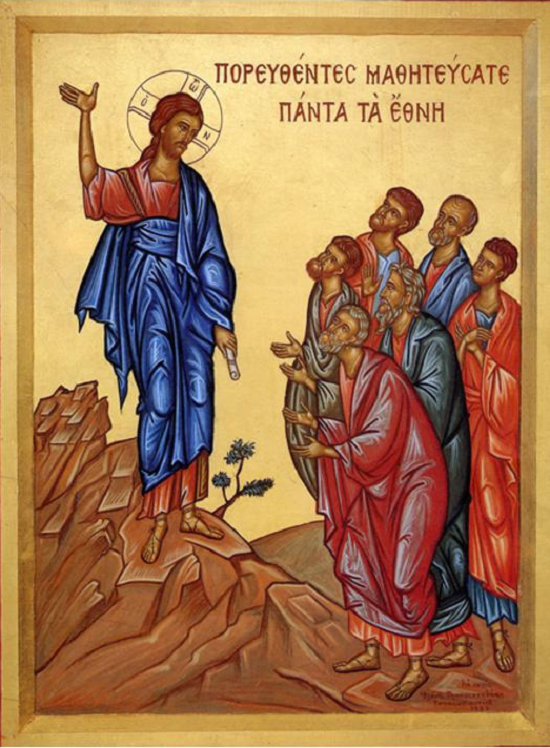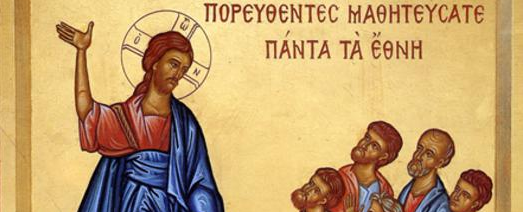What’s a Follower of Christ Like?
Fifth Sunday Scripture Readings

When I was approaching ten years old, my father asked me what I wanted for my birthday. At the time, I was a Boy Scout and very proud of my country. So, I asked him for a flagpole to put up in our front yard. And that’s what my parents gave me, along with a brand new forty-eight-star flag. That’s how long ago that was. Dad helped me set the base in concrete. I painted and assembled the thirty-foot pole, and he helped me raise it into place. I was never so proud as when I got to raise that flag for the first time.
Fast forward sixty-five years, past Jim Crow, Selma, and Viet Nam; past the Cuban Missile Crisis and duck-and-cover; past Watergate and Stonewall; past Iran and Iraq; past Columbine and Sandy Hook; past climate change, drought, and wildfires; past Christian Nationalism and insurrection; and what happened? Now, when I see pickup trucks festooned in flags or houses decked out in red-white-and-blue bunting, I cringe. My patriotism lies buried under a blanket of national shame.
I remember when I first saw the cross on the hillside in Waterbury, Connecticut; when I first saw pictures of the enormous Christ of the Andes in Rio de Janeiro; when I listened to Dr. Norman Vincent Peale on the radio or watched Monsignor Fulton J. Sheen on TV; when I watched priests and nuns marching side-by-side with Dr. Martin Luther King; when I walked in a religious procession through the streets of Halifax, Nova Scotia; and what was that like? I felt proud to be identified as a Christian and a Catholic.
Fast forward, past separate-but-equal and red velvet ropes across the back pews; past Christian segregation academies and anti-black, anti-immigrant, and anti-woman violence in the name of Christ; past God, the flag, and guns; past the Ratzinger letter and anti-LGBTQ invective from Christian pulpits; past hate-mongering from Jerry Falwell, the “moral majority,” and Evangelicals; past Christian Churches in bed with the politics of discrimination, disenfranchisement, and fascism; so, now what? When I see on public display crosses and statues of Mary and the saints that I used to venerate, I recoil in shame. When asked if I’m a Catholic, what should I say?
Jesus didn’t call on his followers to be militant. None of his followers received the vocation to be numbered among the political movers and shakers. Wealth, power, and prestige were anathema to Jesus and those who would follow him. And so, throughout history, whenever the Christian Church involved itself directly in government, both were ruined. Nothing could be more contrary to the gospel or more disastrous to society than providing political power to people who believe they have a divine mandate to control others—especially those with whom they disagree. The followers of Christ were given no authority to force, coerce, or punish anyone for any reason. You won’t find any of that in the gospels.
Last Sunday, we considered the Beatitudes. We saw the life-giving energy that flows from the attitudes of poverty of spirit, mourning, meekness, piety, mercy, single-mindedness, peacemaking, and long-suffering. Today, we’re being shown how to bring that life-giving energy into our world. Jesus says, “You are the salt of the earth.” What does he mean? In ancient times, salt was a precious commodity. We know it’s necessary for life and health. About two-thirds of the human body is made up of salt water. Those who perspire—especially those in desert regions—require salt as well as water for survival. Until refrigeration, salt was the only preservative available for food, and it was the additive that would make food palatable—especially when it had been around for a while. Salt was so valuable that it was the earliest known sacrifice to the gods, and it was used to pay the soldiers of the Roman legions—from which we get our word, “salary.”
The very presence in the world of followers of Jesus living the life of the Beatitudes is enough to preserve and enhance the very best of life in God’s world. Living that life is not easy, especially in contrast to the rest of humankind who are determined to dominate or destroy others using their wealth, power, and prestige. The life of the Beatitudes is a long game. We’ll seldom see immediate results from our commitment to follow the way of Jesus. We’ll often face discouragement. The “other side” seems always to be winning. Yet, like salt, our contrary way of life preserves and enhances our world. We bring life—the life of the Spirit. The way of the wealthy, powerful, and prestigious ultimately brings only misery, suffering, and death. Once again, far from a symbol of authority, the cross of Christ is a symbol of the futility of wealth, power, and prestige.
“You are the light of the world,” says Jesus. “A city set on a mountain cannot be hidden.” No Christian needs promotional advertising. The life of the Beatitudes itself is so contrary to the general understanding of how life works, that those who live it are an obvious oddity. Those self-proclaimed “Christians” who make a show of their beliefs—especially when they criticize or condemn others for not living up to their self-serving standards—are not followers of Jesus, only appropriating the name to further their own wealth, power, and prestige.
True Christians are people of faith, hope, and love. They aren’t self-reliant, nor do they depend on the worldly props of wealth, power, and prestige to energize and enliven them. Their reliance on God and the power of God’s Spirit working in and through them is enough to sustain them. Because of this, they bring the light of hope and joy to a world under the shadow of futility and despair. Calamities, tragedies, and defeats may dog them, but they’re capable of rising above all of it. They’re the light of hope to a hopeless world. These followers of Christ are often asked, “Where do you get your strength?” “How do you go on?” “How can you find joy amidst all this pain and sorrow?” Yet, even then, these followers of Jesus, heralds of the reign of God, have energy left over to reach out beyond themselves…they possess the energy to love.
Listen to the prayer of Ignatius of Loyola—a prayer to become the light of the world.
Teach us, good Lord,
to serve you as you deserve,
to give and not to count the cost,
to fight and not to heed the wounds,
to toil and not to seek for rest,
to labor and not to ask for any reward,
save that of knowing that we do your will.
There’s one other factor we must take into consideration when we consider what it means to be the “light of the world.” In the Gospel of John, Jesus is quoted as saying to his disciples, “I am the light of the world. Whoever follows me will not walk in darkness, but will have the light of life” [8:12]. When we live the life of the Beatitudes, as followers of Christ, we are more than the light of the world. We are Christ-bearers. We don’t shine with our own light, but we shine with the light and energy of the Holy Spirit—the Spirit who raised Jesus from the dead and who enlivens us with that same eternal life. There is but one Spirit, one life, one light. Our lives of faith, hope, and love make Christ truly present in our world. We live in him and he lives in us, the salt of the earth and the light of the world.
Get articles from H. Les Brown delivered to your email inbox.
